| Dispatch:
Eight Days in Abu Ghraib
July 2003
by Molly Bingham |
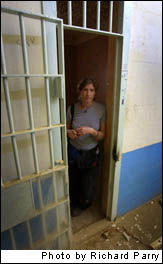
|
I will
not forget when I first returned to Baghdad, walking the length of the
cool marble lobby to the elevators at the Palestine Hotel to go see
Seamus Conlan on the 8th floor and getting in the elevator alone with
a bell boy and his trolley. I had trepidation about entering the building
in the first place. It gave me the creeps to return to the place from
which I’d been taken on the early morning of March 25th. But I
was back, and I was going to see Seamus. Times were different. The regime
had fallen. My concerns that the boogey men who took me from my room
that night were still loitering around in the shadows wasn’t wrong,
but it wasn’t a reason not to return to work either.
There was a moment of silence in the elevator and I felt the bellboy
looking at me. I looked up and said, ‘Salaam’, to which
he simply replied, ‘You’re alive.’
‘Yes, I’m alive.’ He said he was so sorry. He saw
me taken that night. He had prayed for me. He had hoped I was ok. Over
the weeks since then I have encountered many people like that who had
seen me, or knew about my story and had felt unable to do anything on
my behalf.
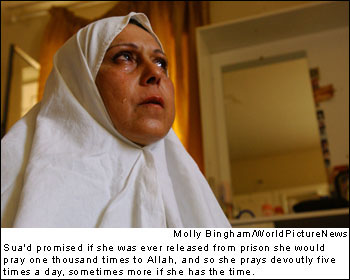 I
had a plethora of choices on how to cover this war. I have been lucky
enough to have a plethora of choices in my entire life. In fact, the
only time I haven’t had choices, I think, was during the eight
days in Abu Ghraib prison, my life was out of my hands. I
had a plethora of choices on how to cover this war. I have been lucky
enough to have a plethora of choices in my entire life. In fact, the
only time I haven’t had choices, I think, was during the eight
days in Abu Ghraib prison, my life was out of my hands.
In the choices I had on how to cover the war there
were the following: Sit it out, too dangerous, not my cup of tea. Embed
with the US military. Go to Iran and pass to Kurdistan. Go to Syria,
and pass to Iraq somehow, but it was hard to really know if I would
be able to cross that border once the war began. I had a three month
multi-entry Kuwaiti visa. I could go to Jordan and try to go overland
to Baghdad either after getting a visa there, or when the war started
and the border would become more porous.
In the months since the drums of war had begun slowly
thumping in, say, August, I had, along with some close friends, constantly
talked about our choices. What equipment we should have, what might
happen. Whether being in Iran would be a good story, might Iran get
pulled in somehow. Would Kurdistan declare an independent state, throwing
the Turks into a tizzy, the Americans unwilling or unable to control
them, and setting the stage for the breakup of Iraq.
As time moved on, through January and February, I became
convinced that the US would attack from the south mostly, move north
and arrive at Baghdad and there, face an entrenched, committed group
of Iraq’s strongest military, and a few million civilians unwilling
to let the city fall. My guess was that rather than fight street to
street in Baghdad the US military would encircle it and put up a siege.
They would bomb and run missions into the capital, but they wouldn’t
try to take it. They would let it fall.
That was my best guess. And given that guess, I began
to feel more convinced, after months of thinking I didn’t want
to be in Baghdad for the war, that it was the place for me to be. The
place for me to go. It was the right part of the story to cover.
My professional situation was not fixed either, which
gave me more freedom. I was pretty sure that if I could get into Baghdad
before the war I would get an assignment. So all the preparation I’d
done, chemical suits, training, night vision equipment, atropine to
counter chemical agents, clothes for cold weather and the north, clothes
for warm weather and the south. Deciding to take a Leica and forty rolls
of film along in addition to the two digital bodies so that should the
dreaded ‘e-bomb’ be used by the American military that I
might still be able to at least photograph, even if I couldn’t
transmit. If everything I owned with a computer chip in it was disabled,
it would basically leave me with clothes, a water purifier, 30 bags
of turkey jerky and my Leica and forty rolls.
When I arrived in Amman with Marco from Rome Newsweek, AP and other
large organizations were pulling staffers out, telling them they had
been advised by the Pentagon to pull all of their staff out of Baghdad
for the war, that the bombing would be merciless and it was just too
dangerous. The people who stayed in Baghdad either managed to convince
their desks, ignored their desks, or were freelancers like me with no
one to answer to but themselves.
The night we got on the bus and made our way to Baghdad
I was very anxious. Marco and I had sat down the day before and I had
tried to talk to him about going. Should we? Should I? I had asked him
what he thought how he felt, but he had cut the conversation short saying,
‘Molly, I do not want to discuss this with you, this decision
has to be your own, I don’t want any part of your choice. You
know the risks, you know everything, we’ve talked it over many
times. You have to make your own decision.’
And how right he was. And that last night before we
left I stayed up all night kicking my head this way and that trying
to find a space where I was resolved either to go, and comfortable with
whatever consequences might follow, or big enough to pull off Baghdad
and say I didn’t want to do it and go North, or to Kuwait, or
go work on another story all together. I decided. I had come this far.
I had heard and known and thought about the risks for months. I had
done the training I could to prepare myself for what I imagined would
be the worst, a chemical or biological attack of some sort. But most
importantly, I felt very strongly that being in Baghdad was the most
important, significant place to be to cover the war, and the what happened
to the civilians there during the bombing, and that I had the capacity
to do that now; visa, preparation, timing, no boss to tell me I couldn’t,
and that these things had come together and I would go. So I did.
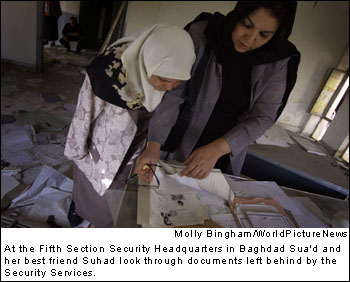 Through
the eight days I spent in Abu Ghraib I never once questioned the decision
I’d made, or wished I’d done it differently. That mental
preparation over the months, and that final night, making that decision,
somehow prepared me for being in prison. It is hard for me to know if
I would have felt differently if I was tortured, I may well have. But
as it is, as it was, the conviction of why I had been in Baghdad at
all, and what I’d come to do, that conviction was never shaken
in me, and I used it as my foundation every time I was interrogated. Through
the eight days I spent in Abu Ghraib I never once questioned the decision
I’d made, or wished I’d done it differently. That mental
preparation over the months, and that final night, making that decision,
somehow prepared me for being in prison. It is hard for me to know if
I would have felt differently if I was tortured, I may well have. But
as it is, as it was, the conviction of why I had been in Baghdad at
all, and what I’d come to do, that conviction was never shaken
in me, and I used it as my foundation every time I was interrogated.
After I was released and returned to New York I began
almost immediately to think about when I would go back. As I slogged
my way through a series of interviews in New York the question was always
posed to me, ‘will you go back to Baghdad?’ At first I thought
I’d only go in if I could go with US military. At that time the
war was still on, troops were still moving, and the statue of Saddam
had not yet been pulled down, symbolically ending the regime. Later,
I began to think I could go back in on my own. Johan went back in about
a week after we were released. Marco went back in a few days later.
I talked to Seamus twice and Marco about how they felt it was, if it
was safe enough for me to come back, did I risk running into some intelligence
guy who had arrested me, and might just kill me at the spot. Seamus
in particular, assured me it wasn’t like that, and that most of
those guys were busy saving their own skins, and had much bigger things
to worry about than me. I figured he was right.
Some friends said they thought I was crazy to return,
or to return so soon. But I decided I was keeping my own council on
this one, and that I would be able to feel when the time was right for
me.
But my biggest reason for returning was truly personal.
I had failed somehow to cover the story. I had become the story, and
being the story was the thing about the whole experience I liked least.
I wanted to go back and tell stories from a place that had had story
lock down for twenty years. So seventeen days after I was released from
prison I hired a GMC and started the fifteen hour drive back to Baghdad
from Amman.
I had an assignment from Glamour magazine to work on
a story relating to women, and I was trying to work out in my brain
what I wanted to work on. After all the talking I’d done about
my experience in prison, I began to think it would be the right way
for me to turn the focus back on the story, and away from me, for me
to go speak to some of the real Iraqi female political prisoners, ones
who had been held for years. Had they been tortured? What were their
charges? Had they been treated like me? Had they been held at Abu Ghraib?
By chance the first translator someone said they knew
who might be free soon was an Iraqi woman named Mona. As Mona and I
began working on the story it became clear that it would not be easy.
Women will not admit to having been in prison for it carries the assumption
that you have been raped, and a raped woman in the Muslim world will
find no quarter. She has no status, she will not be accepted. Some prisoner’s
families even killed them when they were released, I was told. But Mona
and I kept pushing on, asking at every place we could imagine to go:
the Vatican emissary, a hospital run by nuns, the International Committee
of the Red Cross, a prison guard at the women’s prison, Al Rashad.
Finally, after four days of footwork, we found a woman,
Suhad, who had been the Iraqi News anchor for twenty years, and whose
arrest 1989 and release six years later had been big news. She had been
arrested for mentioning in passing, privately, that if Saddam Hussein
was going to criticize America and George Bush, he might consider removing
the American cowboy hat he was wearing when he did so. For that statement
she spent six months in detention, was sentenced to death, had her sentence
commuted, and served five years of a life sentence in Al Rashad women’s
prison until she was released during an amnesty. She agreed to talk
with us, and as she told her story to me, I began to feel that the listening
was helping me untie some of my own fears and memories. Thinking of
my own feelings about my colleagues in prison, I asked her if her friendships
made in prison were important ones, and she said they were the most
critical.
She agreed to introduce me to a few of them, and Mona
and I returned the next day and we went to meet Tunis who had been held
in detention for eight months because of accusations against her mother.
Her brother later came by the house. He had also been detained eight
months, then served two years at Abu Ghraib.
From that first moment when Suhad had started telling
me her story several times I had wanted to burst out and tell her about
mine. Several times over the next week the women would say, ‘you
can’t possibly imagine what it’s like to be in solitary’,
or ‘you can’t possibly imagine the worst part is the detention,
when you don’t know whether you’ll ever see a judge, or
what your sentence will be. Once the sentence is passed you know your
fate, and that is somehow easier.’ Every time I wanted to say,
‘oh, but I do understand, at least a little….’ But
I didn’t. I talked to Mona after that first day and told her,
no matter how much I wanted to that I should not tell these three women
about my experience until after it was finished. I was afraid that if
they knew my story it would color their telling of their own, that there
were things that might go unsaid, a knowing nod seemingly enough to
explain something.
I spent the next two days talking to them, listening
to each of their stories. Sua’d had been detained for six months,
beaten, tortured with electric shock, hung from the ceiling by her arms,
but she said she had not been raped. She then served sixteen years in
Al Rashad prison and had only been released in the general amnesty late
last fall when all the prisoners were released.
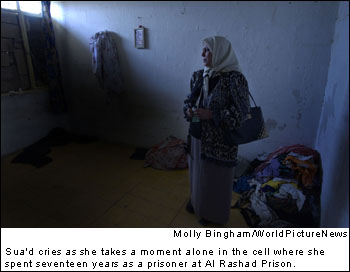 Then
I had to ask them if I could photograph them, if they were going to
return to their prison and place of detention, if I could document their
returns. They were hesitant at first. Suhad, a public figure anyway,
didn’t have a problem with it. Tunis didn’t want to at all,
still feeling unstable 15 yrs after her eight months in detention. Sua’d
was reluctant. She didn’t want me to photograph her. But as Mona
and I talked more with them they agreed and we made the plans about
when they would go back. Then
I had to ask them if I could photograph them, if they were going to
return to their prison and place of detention, if I could document their
returns. They were hesitant at first. Suhad, a public figure anyway,
didn’t have a problem with it. Tunis didn’t want to at all,
still feeling unstable 15 yrs after her eight months in detention. Sua’d
was reluctant. She didn’t want me to photograph her. But as Mona
and I talked more with them they agreed and we made the plans about
when they would go back.
Then the next day we went to the detention center where
they had all been held during the same period of time in 1989. In the
hot midday sun we visited the building that had been destroyed, it was
on a street that had been full of intelligence offices before the Iraqi
Intelligence Service had had new headquarters built for them in the
1990s.
The day after that we went back to Al Rashad. Sua’d
showed me the cell she’d lived in for sixteen years. But the first
thing she did when she walked back into her cell for the first time
since the amnesty was look out a chink in the window and point out her
tree to me. I cried. I had had my own little tree out my own little
window at Abu Ghraib. As for me, Sua’d’s tree had been something
she focused on to keep her going. I stood with her in the window and
cried, still unable to tell her why I was crying.
I spent the whole day there with them, each telling
me their story, their memories of the time spent in prison. The guard
I’d talked to emerged, giving each of them wide hugs and crying,
smiling, so happy to see old friends.
We walked out of the ward and documents were emerging,
the young boys bringing files and files of names and lists and records.
They all looked through them, looking for their own names, names of
their friends. the documents were too old, from the 1970s.
When we were finished, I asked them all to go back
into the ward with me. A dust storm had kicked up and we were all dusty
and covered, and grit in our eyes, and I could tell they wanted to get
in the car and go home, tired and spent.
But the five of us, Mona, Sua’d, Suhad, Tunis
and I stood in the quiet of the cell and I told them I myself had been
arrested and held at Abu Ghraib. That that was part of why I had wanted
to do the story, that I thought people in America often took their political
freedom for granted, and couldn’t imagine the reality of what
it was like to be arrested for nothing and shut away for years. But
most of all that I really thanked them for telling me their stories,
for sharing so much of their time and thoughts with me, for letting
me find the similarities between us, the things we shared. Tunis’
chin dropped, Sua’d looked surprised. Only Suhad stood with that
same confidence looking at me. I told them I had wanted to do the story
because so much press had been focused on my colleagues and me during
our detention, but that I knew full well we were not the story, they
were. These women who had been treated fiercely by the regime, years
of their lives robbed from them were the real story, and I was very
grateful for the opportunity to tell it.
The one thing I didn’t anticipate in my return
was the incredible personal importance of overlaying my experience in
Baghdad and in Abu Ghraib prison with a new one. I had reluctantly been
part of the story for ten days, and I wanted very much to get back to
telling it, rather than being it. Had I not returned to Baghdad, I’m
sure it would have become a sort of mythical place, a house of terrors,
a boogey man in my mind. By coming back when I did I managed to slowly,
meticulously, day by day, paste over that experience with a new collage
of faces, voices and experiences. And for that I am very glad. The Iraqi
people have been wonderful. I have been welcomed into people’s
houses, into their lives, been told secrets of their feelings and things
they couldn’t mention for years, stories they locked up inside
their heads not even telling their friends. it is with great relief
that the place I have returned to is a place where most people feel
they can speak their mind to a stranger.
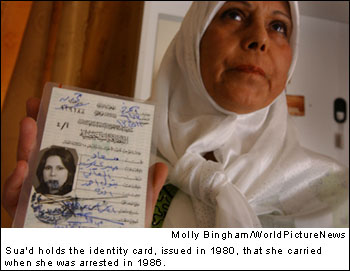 One
would think I might have a certain hatred of the regime, having been
arrested, etc, but, in fact, I find myself still critical of the war,
critical of the American presence here, its ineffectiveness, it’s
unwillingness to rely on the skilled and knowledgeable people of Iraq,
the seeming lack of respect for a culture thousands of years old, which
has borne the burden of a terrible despot for thirty years, a despot
who was, let us not forget, supported by the Americans throughout the
80’s. That seeming lack of respect sits hard in my stomach, and
I resist telling people I am American. One
would think I might have a certain hatred of the regime, having been
arrested, etc, but, in fact, I find myself still critical of the war,
critical of the American presence here, its ineffectiveness, it’s
unwillingness to rely on the skilled and knowledgeable people of Iraq,
the seeming lack of respect for a culture thousands of years old, which
has borne the burden of a terrible despot for thirty years, a despot
who was, let us not forget, supported by the Americans throughout the
80’s. That seeming lack of respect sits hard in my stomach, and
I resist telling people I am American.
There is a deep irony in an American Colonel giving
an interview, standing in a mass grave of Shias killed after the failed
uprising in 1991 and promising that his forensics team will collect
the data needed to prosecute the killers. That irony seems lost on the
Colonel, and apparently on the soldiers protecting him. But it is not
lost on the Iraqis digging their friends, families and brethren out
of a grave by their bare hands, carefully laying each body in a white
shroud, noting clothing and identity papers to help the families identify
them. As one Iraqi standing by told a journalist, ‘it’s
a pity the Americans didn’t come here twelve years ago’.
And as an American, the irony is not lost on me.
I appreciate the value of an Iraq, free to speak its
mind for the first time in decades. But that value will be diminished
if they are not allowed to do so. It will be no freedom at all, if the
Iraqis themselves are not allowed to shape their future, to rebuild
their country, to choose their leadership, even if it is a Shia government,
or the Ba’ath party. It is theirs to choose. And we must respect
that.
Footnote: I would like to thank all the journalists
who remained in Baghdad while I was a prisoner who pushed and pulled
the regime to try to get info about our whereabouts. That took real
balls and conviction, and I cannot thank them enough. I also again want
to thank my family, my sister, my parents, my friends, my colleagues
and the apparently huge number of people I have never even met who came
together on our behalf to ensure our safe release. The longer I am here
in Iraq, the luckier I realize we were, and the more I treasure these
continuing days I’ve been given. My many, many thanks.
© Molly Bingham
Molly Bingham is a freelance photojournalist.
She was taken prisoner in Baghdad March 26 with four other journalists
and released in Jordan eight days later.
Her portfolio can be viewed on the website of WorldPictureNews:
http://www.worldpicturenews.com
http://www.worldpicturenews.com/portfolios/index.htm
email to Molly Bingham will be forwarded to her from
this address: taraf@worldpicturenews.com
|